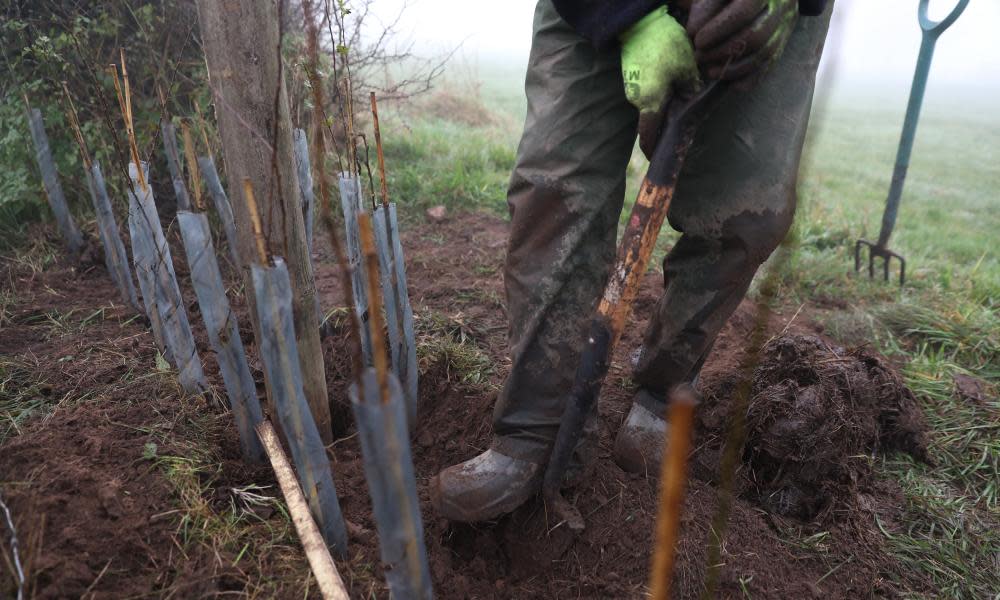Farmers urge UK government to fund hedge creation to bolster biodiversity

Farmers are urging the government to include hedge creation in its nature-friendly farming subsidy scheme in an attempt to increase biodiversity.
Details about the post-Brexit replacement for the EU’s common agricultural policy have been scarce, with land managers simply told they would get payments for providing “public goods” such as protecting nature.
More than 1,100 farmers surveyed by Farmers Weekly, on behalf of CPRE, the countryside charity, revealed a lack of funding was by far the biggest obstacle to planting and maintaining hedgerows.
Wildlife and nature corridors are seen as the greatest benefit of hedgerows by almost nine in 10 farmers. Other perceived benefits include providing shelter or shade for crops or livestock and a home for pollinators and pest predators.
About 70% of farmers said they would plant more hedgerows if they were given the right incentives by government, while 82% supported the idea of government-funded nature-friendly farming focusing on hedgerows to increase their quality and abundance.
Related: Scrapping farm nature payments may worsen English river pollution up to 20%
CPRE is calling for the government to adopt a target of 40% more hedgerows by 2050 to increase nature in the countryside, and to use the new payments system, the environment land management scheme (ELMs), to incentivise farmers to plant them.
Tom Fyans, the interim chief executive of CPRE, said: “Farmers could not have been clearer about the value they place on hedgerows – they really care about supporting wildlife and nature on their land. The government needs to tap into their enthusiasm by using ELMs to provide simple, accessible schemes that support farmers to look after their hedgerows for everyone’s benefit.”
A report on hedgerows, authored by the charity and published on Tuesday, suggests farmers could be incentivised to work together to create mosaics of hedges spanning multiple farms, providing valuable wildlife corridors. It found 94% of farmers had found barriers to planting hedgerows, such as the time and money involved, while 59% had created some in the past 10 years and intended to make more in the next five.

Wilfred Emmanuel-Jones MBE, a farmer on the Devon-Cornwall border, said: “Historically, hedgerows were planted as a barrier or to mark a boundary between parcels of land or neighbouring properties, but they are so much more.
“Sensitively managed, they are multifunctional and, for me, add to the beauty of the countryside. We all need to find ways to protect nature and the environment as we face the effects of climate change, and if increasing the extent of UK hedgerows by 40% by 2050 can be part of that change, it certainly has my vote and support.”
Agriculture has historically been one of the largest drivers of biodiversity loss, with rivers polluted by slurry, forests cut down to graze livestock and produce animal feed, and hills stripped of their flora by sheep.
Landowners told the environment secretary, Thérèse Coffey, last week that they were “running out of patience” because of delays to the funding scheme, with details about what farmers could do to increase their income taking years to emerge.
Ministers said further information about the schemes would be announced in the new year.
A Defra spokesperson said: “Hedgerows are an important ecological building block in our landscapes – maintaining the distinctive character of our countryside, improving local air quality, and providing crucial habitats for wildlife.
“Our countryside stewardship schemes are already helping farmers maintain and restore over 10,000km of existing hedgerow and plant an additional 4,000km of hedges right across the country. Next year, we will also be expanding the sustainable farming incentive to boost nature further by directly investing in improving soil health, water quality and biodiversity for future generations.”

 Yahoo Movies
Yahoo Movies 
